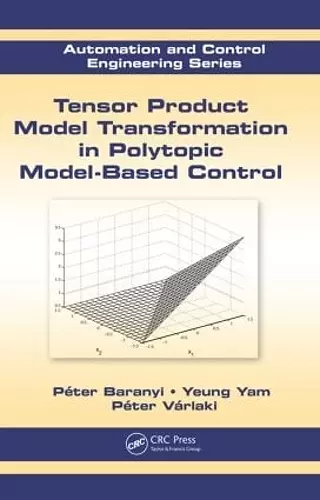Tensor Product Model Transformation in Polytopic Model-Based Control
Péter Baranyi author Yeung Yam author Péter Várlaki author
Format:Hardback
Publisher:Taylor & Francis Inc
Published:19th Aug '13
Currently unavailable, our supplier has not provided us a restock date
This hardback is available in another edition too:
- Paperback£62.99(9781138077782)

Tensor Product Model Transformation in Polytopic Model-Based Control offers a new perspective of control system design. Instead of relying solely on the formulation of more effective LMIs, which is the widely adopted approach in existing LMI-related studies, this cutting-edge book calls for a systematic modification and reshaping of the polytopic convex hull to achieve enhanced performance. Varying the convexity of the resulting TP canonical form is a key new feature of the approach. The book concentrates on reducing analytical derivations in the design process, echoing the recent paradigm shift on the acceptance of numerical solution as a valid form of output to control system problems. The salient features of the book include:
- Presents a new HOSVD-based canonical representation for (qLPV) models that enables trade-offs between approximation accuracy and computation complexity
- Supports a conceptually new control design methodology by proposing TP model transformation that offers a straightforward way of manipulating different types of convexity to appear in polytopic representation
- Introduces a numerical transformation that has the advantage of readily accommodating models described by non-conventional modeling and identification approaches, such as neural networks and fuzzy rules
- Presents a number of practical examples to demonstrate the application of the approach to generate control system design for complex (qLPV) systems and multiple control objectives.
The authors’ approach is based on an extended version of singular value decomposition applicable to hyperdimensional tensors. Under the approach, trade-offs between approximation accuracy and computation complexity can be performed through the singular values to be retained in the process. The use of LMIs enables the incorporation of multiple performance objectives into the control design problem and assurance of a solution via convex optimization if feasible. Tensor Product Model Transformation in Polytopic Model-Based Control includes examples and incorporates MATLAB® Toolbox TPtool. It provides a reference guide for graduate students, researchers, engineers, and practitioners who are dealing with nonlinear systems control applications.
"… well written and easily readable. … The examples and applications to 3 Degrees Of Freedom (DOFs) control schemes for helicopters, models for aeroelastic wing sections and models for controlling the behavior of suspension system in heavy trucks are the main strength of the book. … for control engineers with a solid mathematical formation as well as control theorists and even applied mathematicians."—zbMATH 1308 in 2015
"The book provides an introduction to a method that has potential to significantly advance the theory and practice of control system design. The modeling step is frequently the most time-consuming stage of practical control system design. The unifying TP representation of quasi LPV models described in this book has potential to make this stage more efficient as well as enabling many of the powerful LMI-based control design methods for LPV systems to be applied to practical problems."—James Whidborne, Cranfield University, Bedfordshire, UK
"… well written and easily readable. … The examples and applications to 3 Degrees Of Freedom (DOFs) control schemes for helicopters, models for aeroelastic wing sections and models for controlling the behavior of suspension system in heavy trucks are the main strength of the book. … for control engineers with a solid mathematical formation as well as control theorists and even applied mathematicians."
—zbMATH 1308 in 2015
"The book provides an introduction to a method that has potential to significantly advance the theory and practice of control system design. The modeling step is frequently the most time-consuming stage of practical control system design. The unifying TP representation of quasi LPV models described in this book has potential to make this stage more efficient as well as enabling many of the powerful LMI-based control design methods for LPV systems to be applied to practical problems."
—James Whidborne, Cranfield University, Bedfordshire, UK
ISBN: 9781439818169
Dimensions: unknown
Weight: 589g
262 pages